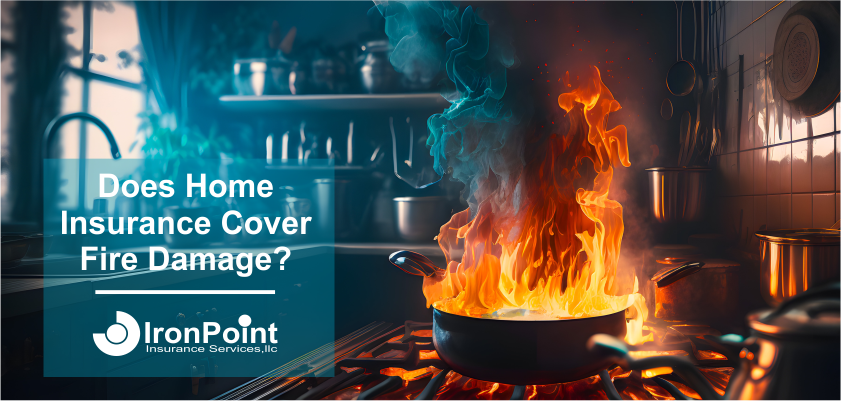Fire Damage and Home Insurance: Uncovering How Coverage Works

Fire damage doesn’t wait for you to understand your insurance policy. It strikes without warning, transforming everything you’ve built into ash and memory faster than you can say “comprehensive coverage.”
Morbid? Perhaps. But facing this uncomfortable truth might be the most important five minutes you spend all year.
And while your homowners insurance policy stands ready to resurrect your life from the cinders, there’s a canyon-sized gap between what most policies cover and what most homeowners understand.
Think you’ve got fire damage figured out because you pay your premiums on time? Think again. Most homeowners discover the fine points of their coverage while standing in the smoking remains of their living room – precisely when clarity matters most and is hardest to find.
The Four Essential Fire Damage Coverages Every Homeowner Needs to Understand
Your home insurance policy isn’t just paper – it’s financial body armor against disaster. But like any armor, knowing its strengths and vulnerabilities determines whether you walk away wounded or intact.
1. Dwelling Coverage: Your Complete Fire Damage Restoration Plan
This isn’t just about walls and a roof. It’s the difference between rebuilding your castle and settling for a cottage.
When fire turns your kitchen into a post-apocalyptic movie set, dwelling coverage rebuilds it – right down to those quartz countertops you splurged on. But here’s the crucial part most miss: “up to policy limits.”
Those three words determine whether you return to the home you love or its downsized cousin.
The difference?
Knowing your actual replacement cost instead of accepting whatever number appeared when you signed up.
2. Other Structures: Protecting Against Fire Damage Beyond Your Main Home
That man-cave garage where you’re banished on weekends? The she-shed where creativity happens? Your policy covers these detached structures against fire damage, typically at 10% of your dwelling limit.
But most homeowners treat these structures like distant relatives – acknowledged at holidays but forgotten the rest of the year. Until fire damage claims them and suddenly that workshop represents thousands in unplanned expenses.
3. Personal Property: Recovering Your Belongings After Fire Damage
Your policy doesn’t just replace structures – it replaces what makes a house your home. From that sofa that perfectly fits your nap dimensions to the blender that makes post-workout protein shakes at exactly the right consistency.
Replacing these possessions is the superpower of personal property coverage.
But some items – jewelry, collectibles, art – need special attention, like the high-maintenance friends in your contact list. Standard policies enforce strict limits on these categories unless you specifically schedule them.
4. Additional Living Expenses: Surviving Displacement After Fire Damage
This overlooked coverage becomes your financial lifeline when your home becomes uninhabitable. Hotels, restaurants, laundromats – the expenses pile up faster than the reconstruction crew lays foundation.
Most policies offer reasonable limits, but “reasonable” and “sufficient” aren’t always the same thing – especially in high-cost areas or during prolonged rebuilds. Knowing your limits before the flames means one less surprise afterward.
Get The FREE Home Insurance Review Checklist
Quickly identify coverage gaps and strengthen your insurance protection with our easy and FREE Home Insurance Review Checklist.
Common Causes of Fire Damage Covered By Your Home Insurance Policy
Despite what cynics believe, insurance companies do pay claims – millions of them annually. Your policy stands guard against:
- Lightning’s creative redecorating: When nature decides to rewire your home without permission
- Electrical rebellion: When decades-old wiring finally stages its uprising
- Kitchen ambition gone wrong: That flambé technique that looked easier on YouTube — but started a holiday fire.
- Appliance betrayal: When “energy efficient” becomes “efficiently combustible”
- Wildfire wanderlust: Because sometimes your neighbor’s problem crosses property lines
Pro-Tip: If you live in wildfire territory, especially California, your coverage might involve a FAIR Plan with a DIC endorsement – insurance’s version of a tag team. Know which partner handles fire and which handles everything else, because in insurance as in wrestling, tag team coordination matters.
Fire Damage Situations Not Covered By Standard Home Insurance
Home insurance exists to protect against accidents, not poor decisions. Most policies rightfully exclude:
- DIY arson: Setting your own property ablaze isn’t “extreme renovation” – it’s fraud
- Olympic-level negligence: That chimney you’ve ignored despite multiple warnings? That’s on you
- Ghost properties: Vacant homes face different risks, requiring different coverage
These boundaries don’t represent insurance companies being stingy – they reflect the social contract of shared risk that makes affordable home insurance coverage possible at all.
Enhanced Fire Damage Protection Options Worth Every Penny
Basic coverage works for basic situations. But when fire transforms your life from routine to catastrophe, these enhancements make the difference:
1. Extended Replacement Cost: Complete Fire Damage Reconstruction Coverage
Disasters create demand surges that inflate rebuilding costs just when you need stability most. This coverage extends your dwelling limit by 25-50%, creating breathing room between “covered” and “fully restored.”
Without it, you’re vulnerable to market forces at precisely the wrong moment. With it, your home’s resurrection isn’t compromised by economic timing.
2. Enhanced Living Expenses: Comprehensive Support During Fire Damage Recovery
Standard temporary living coverage works for standard timelines. But rebuilding, especially in heavily regulated areas, often follows its own unpredictable schedule.
This enhancement extends your displacement coverage, preventing financial strain from compounding emotional stress when reconstruction timelines stretch.
Fire Damage Claim Steps That Maximize Your Insurance Recovery
When flames subside, these steps determine whether your claim becomes a recovery story or a cautionary tale:
- Safety first, possessions second. Charred structures collapse without warning. No possession justifies that risk.
- Document with obsessive detail. In the digital age, there’s no excuse for inadequate documentation. Photos, videos, lists – create them all.
- Track every post-fire penny. From toothbrushes to temporary housing, each expense tells part of your recovery story. Tell it completely.
- Secure what remains. Board openings, cover exposed areas. This isn’t just smart – most policies require reasonable steps to prevent further damage.
How Your Home Insurance Premium Is Calculated
Your home insurance isn’t priced by dartboard or on the back of cocktail napkins. Your premium reflects real factors:
- Your home’s location relative to nature’s tinderbox zones
- The age and materials of your electrical system
- Your proximity to fire hydrants and stations
- Construction materials that resist or accelerate flames
Most insurers reward fire-smart choices – sprinklers, smoke detectors, fire-resistant roofing. These investments pay both immediate safety dividends and long-term premium benefits.
Understanding Your Fire Damage Coverage Before Disaster Strikes
Your policy covers fire damage. That’s not the question. The real questions are:
- Is your dwelling limit adequate for actual rebuilding costs?
- Are your outbuildings and possessions properly valued?
- Have you considered coverage enhancements appropriate for your situation?
- Do you know what to do when the smoke literally clears?
Most homeowners can’t answer these questions – not because insurance is incomprehensible, but because they’ve never tried to comprehend it. Until flames appear on the horizon.
You have a choice: Understand your fire damage coverage now, in the calm of routine life, or attempt to decipher it while standing in ashes.
The smart money’s on “now.”
At IronPoint Insurance Services, we specialize in translating insurance from an alien language to plain English. We’ll help ensure your fire damage coverage matches your home’s actual replacement cost value and your family’s actual needs – before you have reason to test it.
Contact us today. Because when it comes to fire damage protection, clarity shouldn’t wait for smoke signals.
Don’t like the phone, start the conversation online.
Let’s Get Started
Select the way you want to start your quote.
Let’s Get In Touch
Compare Quote Online
Let’s Get Started

Want to know if you can save on home or auto insurance? See for yourself. Start a quote today.
Call today and speak with a professional insurance agent.
1-877-334-7646






